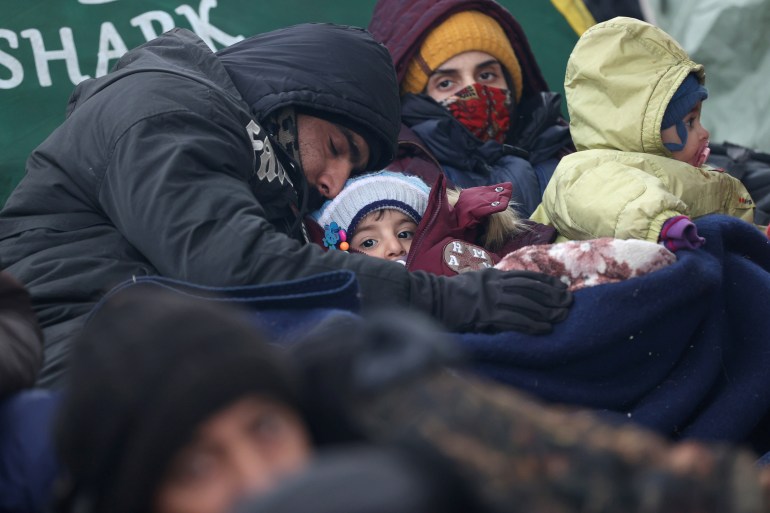EU agrees new sanctions on Belarus over border crisis
European Union to impose new sanctions on Belarus over crisis that has left thousands of migrants stranded on its borders.

The European Union has decided to impose new sanctions against Belarus, accusing it of driving a crisis that has left thousands of migrants and refugees stranded in freezing forests on its borders with the EU.
The Western bloc is seeking to stop what it says is a policy by Belarus to push migrants towards it in revenge for earlier sanctions. Belarus has rejected the allegations.
Keep reading
list of 3 itemsIraq to start repatriating its citizens at Poland-Belarus border
Poland-Belarus border: ‘People are dying in the forest’
The asylum seekers, who are mostly from Iraq and Afghanistan, began arriving on Belarus’s land borders with the EU this year, trying to cross into member states Lithuania, Latvia and Poland via routes not used before.
“This inhumane system of using refugees as tools to exert pressure on the European Union … has got worse over the last days,” German Foreign Minister Heiko Maas said on Monday, pledging to target those involved in what he called “human trafficking”.

The top EU diplomat, Josep Borrell, said a fifth package of sanctions had been agreed by EU foreign ministers and would be finalised in the coming days.
They would target airlines, travel agencies and individuals involved in “this illegal push of migrants”, he said.
Later on Monday, Germany’s Angela Merkel spoke to her Belarusian counterpart Alexander Lukashenko, while Russian President Vladimir Putin discussed the crisis with French leader Emmanuel Macron, in an effort to resolve the issue.
People getting through
Stranded on the Belarusian side of the border and increasingly desperate, the migrants and refugees have tried to force makeshift fences in several places in recent days.
Poland, which has reported 5,100 irregular attempts to cross the border so far in November, has been criticised for its treatment of those who make it through.
Al Jazeera’s Assed Baig, reporting from the town of Hajnowka, near Poland’s border with Belarus, said the presence of approximately 15,000 Polish security forces in the area did not appear to be deterring asylum seekers from attempting to cross into the EU.
“Regardless of how many forces Poland puts along the border … people are still managing to get through,” he said.
“And we are hearing that there is a push this morning on the Belarusian side, from those people who are stuck there, to again try and get past the border.”
Latvia said on Monday it had deployed 3,000 troops for a previously unannounced military exercise near the border. It, Lithuania and Poland make up the eastern flank of the EU and NATO, the paramount Western military alliance.
The EU executive said it was looking into whether other airlines should face sanctions after the bloc banned Belarus’s state-owned carrier Belavia from its skies and airports. Germany’s Maas stressed Turkish Airlines had stayed away.
Ireland said EU aircraft leasing contracts with Belavia would also end.
‘Absurd’
The Belarusian foreign ministry said accusations Minsk had engineered the border crisis were “absurd”, while Lukashenko said Belarus was trying to convince migrants to go home but that none of them wanted to return.
Minsk would retaliate against any new EU sanctions, he said.
The EU has been stepping up sanctions on Belarus for months. Curbs already in place include blacklisting of Lukashenko, his son and 165 other Belarusian officials, as well as restrictions on trade in potash, an important export.

Lukashenko on Monday discussed the crisis with Merkel, in his first phone call with a Western leader since suppressing mass protests in Belarus last summer.
The pair discussed bringing humanitarian aid to people stuck at the border, Minsk and Berlin said.
Lukashenko’s Russian ally Vladimir Putin discussed the crisis with French President Emmanuel Macron, with both leaders calling for the crisis to be de-escalated, Macron’s office said.
Lukashenko earlier said Belarus did not want the border situation to escalate into a “conflict” and that it was working to send home the several thousand migrants camping on its wooded border with Poland in damp and freezing conditions.
“Active work is under way in this area, to convince people – please, return home. But nobody wants to go back,” Lukashenko said, as quoted by state news agency Belta.
But Lithuanian Foreign Minister Gabrielius Landsbergis, speaking for many of the 27 EU governments, said Brussels had “no reason” to believe Lukashenko.
The Belarusian leader also suggested that, if Poland does not provide a “humanitarian corridor”, Minsk could ferry people to Germany via its state-run airline Belavia.
“We will send them to Munich by our own planes, if necessary,” Lukashenko said.